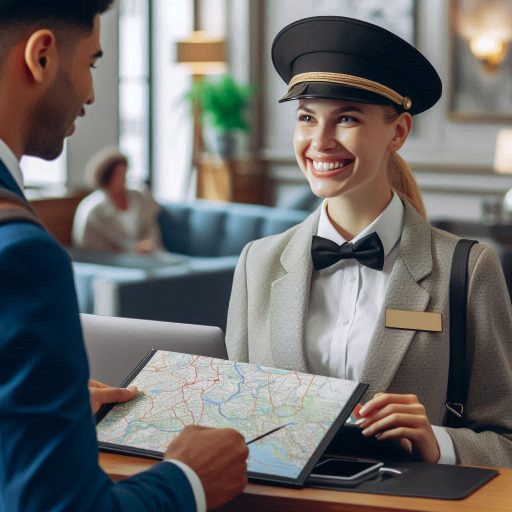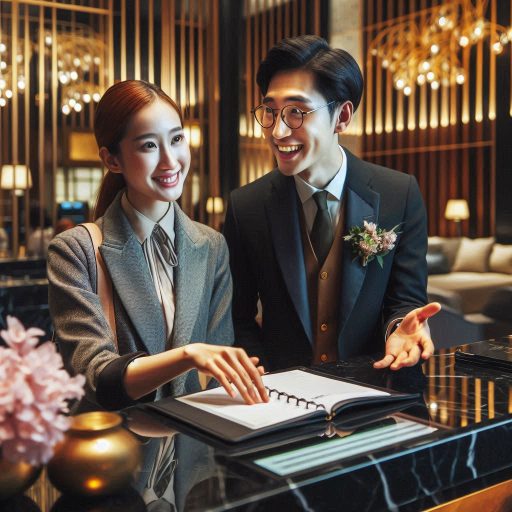Introduction
Concierge services provide personalized assistance to individuals and businesses.
These services range from travel planning to event management.
Traditionally, concierges offered help through face-to-face interactions.
However, the rise of technology is changing how these services operate.
Technology has transformed the concierge industry significantly.
Digital tools now streamline communication between clients and service providers.
Instead of relying solely on phone calls or in-person visits, clients can connect via apps and websites.
This shift allows for quicker responses and increased convenience.
Many high-tech tools enhance the concierge experience.
Mobile apps allow users to request services instantly.
They can book restaurant reservations, arrange transportation, or plan activities with just a few taps.
This accessibility has made concierge services more appealing to tech-savvy consumers.
Artificial Intelligence (AI) is another game-changer in the concierge field.
AI-powered chatbots can handle routine inquiries 24/7.
They provide instant answers and reduce wait times for clients.
This efficiency allows human concierges to focus on more complex requests.
AI tools also analyze user preferences and behavior, offering personalized recommendations.
Virtual Concierge Apps
Overview of virtual concierge apps
Virtual concierge apps have transformed the hospitality industry by streamlining guest services through technology.
These apps act as a digital concierge, offering guests immediate access to a wide range of services.
Whether it’s booking a restaurant, arranging transportation, or requesting room service, virtual concierge apps simplify these tasks, enhancing the guest experience.
Benefits of Using Virtual Concierge Apps in the Hospitality Industry
In the hospitality industry, guest satisfaction is key.
Virtual concierge apps play a vital role in delivering that satisfaction by offering convenience and efficiency.
These apps are accessible 24/7, eliminating the need for face-to-face interactions for simple tasks.
For example, instead of calling the front desk, guests can book spa appointments or order room service with a few taps on their phone.
This reduces wait times and ensures guests’ needs are met promptly.
The use of virtual concierge apps offers several benefits to hotels and guests alike.
First, they help reduce operational costs for hotels by minimizing the need for staff to handle routine guest requests.
This allows hotel staff to focus on more complex tasks, improving overall efficiency.
Second, these apps enhance personalization.
Virtual concierge apps can store guest preferences, allowing for tailored recommendations and services.
This personalized approach increases guest satisfaction and encourages repeat visits.
Another major benefit of virtual concierge apps is the convenience they provide for guests.
Modern travelers prefer self-service options and expect quick responses.
Virtual concierge apps meet this demand by offering instant access to information and services.
Guests can easily navigate the hotel, check available amenities, or explore local attractions at their own pace, leading to a more enjoyable and stress-free stay.
Examples of Popular Virtual Concierge Apps
Many popular virtual concierge apps are now integrated into leading hotels.
ALICE is one of the top examples, widely used in luxury hotels worldwide.
It allows guests to request services, communicate with hotel staff, and even control room features like lighting and temperature.
Another popular app, Conichi, focuses on streamlining check-ins and check-outs, allowing for a completely contactless experience.
Ivy, a text-based virtual concierge, sends automated messages to guests, offering recommendations and responding to common inquiries, providing a highly personalized experience.
In summary, virtual concierge apps are revolutionizing the hospitality industry by providing efficient, personalized, and convenient services to guests.
These apps not only improve guest satisfaction but also reduce operational costs and increase hotel efficiency.
As technology continues to evolve, the use of virtual concierge apps will likely become a standard in the hospitality world, setting new expectations for guest service.
Are you planning to explore any other high-tech tools used in the hospitality industry, or would you like to focus more on virtual concierge apps for now?
Read: How Much Do Pet Groomers Earn in the USA?
AI-powered Chatbots
AI-Powered Chatbots in Concierge Services
AI-powered chatbots are transforming concierge services by providing quick, efficient, and personalized support.
These chatbots, powered by artificial intelligence, simulate human interactions, allowing businesses to handle customer inquiries 24/7 without the need for live staff.
Unlike traditional systems, AI-powered chatbots can understand and respond to complex queries in real-time, making them a perfect fit for concierge services.
How Chatbots Enhance Customer Experience and Efficiency
One of the biggest advantages of AI-powered chatbots is their ability to enhance customer experiences.
These chatbots provide instant responses to customer questions, reducing wait times and increasing satisfaction.
When a guest needs restaurant recommendations or assistance with bookings, a chatbot can provide immediate options.
This eliminates the need for customers to wait for human concierge staff to become available, improving overall efficiency.
In addition to faster response times, AI-powered chatbots can offer personalized recommendations based on customer preferences.
By analyzing past interactions and user data, chatbots can suggest relevant services or products, making the experience feel more tailored and exclusive.
This personalization creates a more memorable customer journey, which can help businesses retain loyal clients.
AI-powered chatbots also enhance efficiency in concierge services by automating routine tasks.
Simple requests like booking a table, scheduling an appointment, or providing travel directions are easily handled by chatbots, allowing human staff to focus on more complex issues.
This division of labor ensures that customers always receive prompt assistance, even during peak business hours, improving overall operational efficiency.
Success Stories of Businesses Utilizing AI-Powered Chatbots
Many businesses have already experienced great success by integrating AI-powered chatbots into their concierge services.
For example, Marriott International introduced a chatbot to handle guest requests.
The chatbot efficiently processes room service orders, local recommendations, and more, leading to faster service times and improved guest satisfaction.
As a result, Marriott has seen higher guest retention and positive reviews related to their AI-powered concierge support.
Another notable success story is that of Hilton Hotels.
By implementing an AI-powered chatbot named ‘Connie,‘ Hilton can now provide guests with 24/7 concierge services.
Connie can answer a variety of guest inquiries, from hotel amenities to nearby attractions, delivering information instantly.
Hilton has reported that guests using Connie have experienced shorter wait times and greater convenience during their stay.
AI-powered chatbots have clearly revolutionized concierge services by improving customer experiences, increasing efficiency, and driving higher satisfaction levels.
As businesses continue adopting AI technology, chatbots will play an even bigger role in shaping the future of concierge services.
Ensuring faster, more personalized, and seamless interactions for customers.
Read: Top Pet Grooming Conferences and Expos in the USA
Smart Home Devices
Introduction to the Use of Smart Home Devices in Concierge Services
Smart home devices are transforming how concierge services cater to guests, making personalized experiences seamless and efficient.
These devices, including smart speakers, lighting systems, and security cameras, provide guests with unparalleled convenience and comfort.
By integrating smart home technologies into concierge services, service providers can enhance their offerings while streamlining operations.
Features of Smart Home Devices That Can Improve Guest Experience
One key feature of smart home devices is voice-activated control.
Guests can adjust lighting, temperature, and entertainment systems simply by speaking to a smart speaker.
This instant control allows guests to create their preferred atmosphere without the need for assistance from concierge staff.
By using voice commands, they can personalize their environment, making their stay more comfortable and satisfying.
Smart lighting systems are another powerful tool that can improve the guest experience.
These systems allow guests to adjust lighting intensity, color, and mood according to their preferences.
Whether they want bright lighting for work or dim lighting for relaxation, they can customize the ambiance easily.
These smart lighting systems not only elevate the comfort of the stay but also contribute to energy savings.
Security is a top concern for many guests, and smart home devices play a crucial role in addressing this.
Smart locks and security cameras integrated into concierge services provide enhanced protection.
Guests can control access to their rooms or private areas through smartphone apps, ensuring they feel safe and secure throughout their stay.
This control adds peace of mind, especially for high-profile guests or those with valuable belongings.
Integration of Smart Home Devices With Concierge Services for Personalized Experiences
The integration of smart home devices with concierge services enables more personalized experiences for guests.
Concierge staff can access data from these devices to anticipate guest needs and preferences.
For example, they can adjust the room‘s temperature before the guest arrives or ensure their favorite music is playing.
This proactive approach increases guest satisfaction by providing personalized touches that make their stay more memorable.
Another benefit of integrating smart home devices into concierge services is the automation of routine tasks.
By automating functions like room cleaning schedules or meal deliveries, concierge services can operate more efficiently.
This not only enhances guest experience but also reduces staff workload, allowing them to focus on providing higher-value services.
Basically, smart home devices are revolutionizing concierge services by offering personalized, efficient, and secure experiences.
From voice-activated control to enhanced security, these devices improve every aspect of a guest‘s stay.
By seamlessly integrating smart home technology with concierge services, businesses can provide a higher level of service, ensuring guest satisfaction and loyalty.
As technology advances, the role of smart home devices in concierge services will only grow, offering even more innovative ways to enhance guest experiences.
Read: Educational Requirements for Childcare Workers Explained

Internet of Things (IoT) in Concierge Services
Understanding the Role of IoT in Concierge Services
The Internet of Things (IoT) is transforming concierge services by enhancing convenience and personalization for guests.
IoT refers to interconnected devices that collect and exchange data, enabling smarter operations.
In the hospitality industry, IoT plays a crucial role in streamlining tasks, improving communication, and boosting guest satisfaction.
Examples of IoT Devices Used in the Hospitality Industry
One of the primary uses of IoT in concierge services is automating room controls.
Hotels now offer smart rooms equipped with IoT-enabled devices.
Guests can use these devices to adjust room temperature, lighting, and entertainment systems through their smartphones or voice commands.
This personalized control adds a level of convenience that traditional systems simply can’t match.
Another innovative IoT application is keyless entry.
Smart locks allow guests to access their rooms using their mobile devices, eliminating the need for physical keys or keycards.
This not only speeds up the check-in process but also provides added security.
Smart speakers, such as Amazon Echo and Google Home, are also making their way into hotel rooms.
These devices act as virtual concierges, allowing guests to request room service, book spa appointments, or ask for local recommendations without speaking to a human concierge.
This real-time interaction adds convenience and enhances the guest experience.
IoT devices also help hotel staff operate more efficiently.
For instance, housekeeping schedules can be optimized with sensors that detect room occupancy.
These sensors notify staff when a room is ready for cleaning, minimizing disruptions to guests and improving staff workflow.
Smart refrigerators in hotel kitchens are another example of IoT in action.
These refrigerators monitor inventory levels, track expiration dates, and even place orders automatically when supplies are low.
This reduces waste and ensures that the kitchen always has the necessary ingredients, contributing to better service delivery.
Impact of IoT on Operational Efficiency and Guest Satisfaction
The impact of IoT on operational efficiency is undeniable.
Automated systems reduce human error and speed up various processes, allowing staff to focus on more important tasks.
For example, predictive maintenance systems in hotels monitor equipment health and alert technicians when repairs are needed, preventing costly breakdowns.
Guest satisfaction also improves with IoT integration.
Personalized services, real-time communication, and the ability to control their environment lead to a more enjoyable stay.
Guests appreciate the seamless experience that IoT-enabled devices provide, resulting in positive reviews and repeat visits.
Generally, IoT is revolutionizing concierge services by increasing operational efficiency and elevating the guest experience.
As technology continues to advance, its role in hospitality will only grow, driving further innovation in the industry.
Read: Top Certifications for Advancing in Childcare Careers
Mobile Key Technology
The Adoption of Mobile Key Technology in Concierge Services
Mobile key technology is transforming concierge services by enhancing convenience, security, and efficiency for guests and hotel staff.
This cutting-edge solution allows guests to unlock their hotel rooms using their smartphones, eliminating the need for physical keys or keycards.
As more hotels adopt this innovation, it is quickly becoming a standard in the hospitality industry.
Advantages of Using Mobile Keys for Guests and Hotel Staff
One of the biggest advantages of mobile keys is the seamless guest experience they offer.
Guests can bypass the front desk entirely, checking in and accessing their rooms directly through their phones.
This not only saves time but also adds a layer of convenience that modern travelers expect.
For those arriving late or in a hurry, mobile keys allow immediate room access without any unnecessary delays.
Hotel staff also benefit from mobile key technology.
Concierge teams can focus on more personalized services rather than handling routine tasks like key distribution.
This creates more opportunities for staff to engage with guests in meaningful ways, improving overall customer satisfaction.
Additionally, mobile keys streamline internal processes, such as room service or housekeeping access, which can be managed remotely.
Security Measures and Protocols in Place for Mobile Key Technology
Security is a top priority when it comes to mobile key technology.
Hotels implement robust security measures to protect both guest data and room access.
Mobile keys are typically encrypted, preventing unauthorized access if a phone is lost or stolen.
Some hotels also require multi-factor authentication to add an extra layer of protection.
This ensures that only authorized users can unlock the room.
Another significant security feature is the ability to instantly deactivate or reassign mobile keys.
In case of any security breach or guest change, hotel staff can remotely control access without needing to physically replace keys.
This reduces the risk of lost keys or unauthorized duplication, a common issue with traditional keycards.
Moreover, mobile key technology offers valuable data insights for hotel management.
By tracking guest room access, hotels can better understand guest behavior and preferences.
This data can be used to optimize services, personalize guest experiences, and improve overall operations.
It also helps detect any unusual activity, allowing staff to act quickly in case of a security concern.
Most importantly, mobile keys are revolutionizing how hotels manage access and enhance service quality, making them a win-win for everyone involved.
Transform Your Career Today
Unlock a personalized career strategy that drives real results. Get tailored advice and a roadmap designed just for you.
Start NowExplore Further: Health and Wellness Tips for Busy Taxi Drivers
Personalized Recommendations and Predictive Analytics
How Technology is Enabling Personalized Recommendations for Guests
Technology is reshaping the way concierge services cater to guests.
Personalized recommendations, powered by data and predictive analytics, allow businesses to anticipate and meet guests’ unique needs.
This high-tech approach goes beyond traditional methods, providing a seamless, tailored experience that boosts customer satisfaction and loyalty.
Personalized recommendations are now driven by advanced algorithms.
These algorithms analyze past interactions, preferences, and behavior to suggest customized services or experiences.
Whether it‘s recommending local attractions, restaurants, or entertainment, technology ensures guests receive options that align with their tastes and expectations.
For example, if a guest frequently dines at vegan restaurants, the system automatically suggests similar venues or events.
This tailored approach enhances guest satisfaction and makes their stay more memorable.
Benefits of Predictive Analytics in Anticipating Guest Needs
Predictive analytics takes this a step further by anticipating what guests may need before they even ask.
Using data from previous visits, social media activity, or booking history, businesses can forecast and fulfill guest requirements.
For instance, if a guest frequently books spa appointments during their stays, predictive systems can preemptively offer special spa packages or reservations.
This proactive service not only delights guests but also increases operational efficiency, allowing staff to focus on delivering top-tier hospitality.
The benefits of predictive analytics in concierge services are profound.
By foreseeing guest needs, businesses can optimize their resources and ensure guests feel valued.
This leads to quicker response times, more personalized service, and ultimately, higher guest retention.
It also reduces friction in the guest experience, minimizing the need for them to request or search for specific services.
With everything anticipated and ready, guests can fully enjoy their stay, fostering a deeper connection with the brand.
Case Studies of Businesses Using Data-Driven Insights to Enhance Concierge Services
Several businesses have successfully integrated these technologies into their concierge services.
Luxury hotel chains like Four Seasons have implemented predictive analytics to enhance their guest offerings.
By analyzing guest preferences, the hotel can provide personalized room settings, dining options, and local experience recommendations.
Similarly, Ritz-Carlton uses data-driven insights to elevate their concierge services, offering unique experiences like curated city tours based on a guest‘s interests.
In the airline industry, companies like Delta Air Lines use predictive analytics to streamline their premium services.
Their concierge teams receive real-time data on guest preferences, enabling them to anticipate and offer tailored services, from transportation to exclusive dining reservations.
Incorporating personalized recommendations and predictive analytics allows businesses to exceed guest expectations.
As more companies adopt these tools, the future of concierge services will be more efficient, guest-centric, and tech-savvy.
The result? A higher level of hospitality that keeps guests returning for more.
Conclusion
High-tech tools are rapidly transforming the concierge industry, offering innovative solutions for both businesses and customers.
From AI-driven chatbots to personalized apps, technology is reshaping how concierges deliver services.
These tools streamline tasks, allowing concierge teams to work more efficiently and cater to customer needs faster.
Automation reduces time spent on manual tasks, freeing up staff to focus on personalized service, improving overall customer experience.
One of the most significant changes is the integration of artificial intelligence.
AI systems analyze customer preferences, enabling concierges to offer tailored recommendations in real time.
This technology anticipates customer needs before they ask, enhancing the convenience and satisfaction customers receive.
As a result, concierge services are becoming more proactive, moving from reactive problem-solving to anticipating what customers want next.
Another game-changer is the rise of mobile apps specifically designed for concierge services.
These apps provide customers with 24/7 access to services, allowing them to book reservations, schedule appointments, and request assistance at any time.
The ability to offer on-demand services through these platforms keeps businesses competitive, while customers enjoy a seamless, always-available experience.
[E-Books for Sale]
The Big Book of 500 High-Paying Jobs in America: Unlock Your Earning Potential
$19.99 • 500 High-Paying Jobs • 330 pages
Explore 500 high-paying jobs in America and learn how to boost your career, earn more, and achieve success!
See All 500 High-Paying Jobs of this E-Book
1001 Professions Without a Degree: High-Paying American Jobs You Can Start Now
$19.99 • 1001 Professions Without a Degree • 174 pages
Discover 1001 high-paying jobs without a degree! Unlock career tips, skills, and success strategies for just $19.99!




